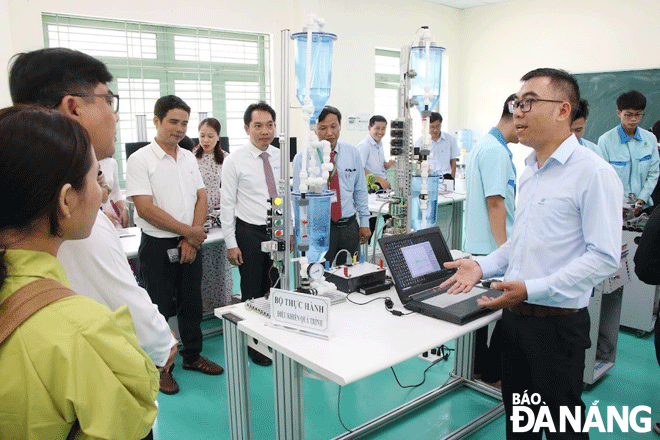Innovation and improvement in vocational education quality
In recent years, Da Nang has been focusing on upgrading the network of vocational education establishments, thereby step by step implementing the municipal Party Committee’s Programme No. 45 on building and implementing training programmes, and developing high-quality human resources, to meet the city's development requirements.
 |
| The Da Nang Vocational College enhances practical lessons for its students. Photo: NGOC HA |
Network of vocational education establishments
Recently, the city has merged the same fields and occupations trained at public vocational schools into public colleges, as well as removed ineffective ones.
Da Nang is now home to 61 vocational education establishments, including 17 colleges, 6 intermediate schools, 12 vocational education centers, and 26 other establishments registered for vocational education activities.
The total annual enrollment scale of the aforementioned units is 60,546 students with 286 majors at different training levels.
Every year, the vocational education system in the locality trains more than 45,000 people, contributing to providing labour resources for Da Nang, and other provinces and cities in Central Viet Nam.
Notably, vocational education institutions have been constantly innovating training programmes to meet practical and urgent needs of businesses.
Mr. Ho Viet Ha, the Principal of the Da Nang Vocational College, said that his school trained majors in the fields of high technology, engineering, economics - tourism, fashion and logistics in accordance with the development strategy of the city and central regional localities.
All training programmes pay attention to introducing new technology so that students can access and become familiar with it such as data analysis (economics, services), automatic control, robot operation, new programming technology (engineering-high technology); and data processing and conversion (information technology).
At the same time, the school has provided training courses for lecturers on innovating teaching methods, and how to apply digital technology and use simulation methods.
In addition, lecturers at the school have 4 weeks of field trips at businesses in order to improve knowledge, and update training programmes, Mr. Ha noted.
Improvement of vocational education quality
Under the Programme No. 45, the city has invested and upgraded vocational education facilities.
Specifically, the local government has given green light to implement the VND584 billion project on building the Da Nang Vocational College to become a high-quality school specialising in training international-standard key occupations in ASEAN in general, and key economic industries to meet the city’s development needs in particular.
The municipal People's Committee has also directed departments and branches to continue implementing the Da Nang Vocational Education Development Plan by 2025, with a vision towards 2030.
According to Mr. Le Van Minh, Deputy Director of the municipal Department of Labour, War Invalids and Social Affairs, the city has developed new vocational education establishments according to the labour supply and demand of a number of key economic sectors. At the same time, priority is given to investing in new vocational education facilities in districts of Hoa Vang, Ngu Hanh Son, Cam Le and Lien Chieu.
Besides, the municipal People's Committee assigns the Department of Labour, War Invalids and Social Affairs to preside and coordinate with relevant departments, branches, socio-political organisations and district-level authorities to organise and effectively implement goals and tasks set in the plan to continue to innovate, develop and improve the quality of vocational education until 2030, with a vision to 2045.
Reporting by NGOC HA - Translating by M.DUNG